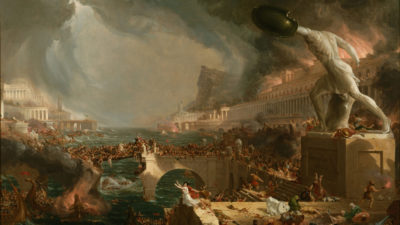I’ve spent the last few months getting into the History of Rome and History of Byzantium podcasts. And along with Mike Duncan, Robin Pierson, and their listeners, I’ve been asking myself: when did the Roman Empire fall?
The traditional view says it fell in 476 CE. But in recent decades, historians have put more emphasis on a ‘continuity and change’ narrative than on a ‘decline and fall’ narrative. Well, which is it? Did the Roman Empire fall in 476 CE? Earlier than that? Or did it live on much longer? Maybe it lasted all the way until the Fall of Constantinople to the Ottoman Empire in 1453?
What was the Roman Empire?
I think getting at the question requires asking what, exactly, the Roman Empire was. Was it simply any society that traces, politically, to the founding of the Empire by Augustus? Was it a line of emperors? A social and political system? A military and religious tradition of pagan empire?
I’d call the Roman Empire a certain vision. It was a political, economic, cultural, and religious vision for a pan-Mediterranean society.
On politics and economics, the Roman Empire was authoritarian at the top. But it also had lots of decentralization at lower levels. Local cities largely took care of their own affairs, so long as they obeyed (and paid) the central state. And the Empire showed unusually high levels of religious tolerance. The pagan emperors tolerated almost all local gods, with only a few brief exceptions (e.g., Christians in certain time periods, notably under Diocletian). Even the later Christian emperors mostly kept this system of tolerance until Justinian and later.
Furthermore, even though the Empire was massive, it had lots and lots of travel and exchange of ideas. It was even more common for Roman citizens of the first and second centuries to move around the Empire than it is for Americans to move across the U.S. today.
The Roman Empire Fell in the 7th Century
While some of this was gone after 476 CE, the 7th century wiped out pretty much all of it. By that point, religious tolerance was largely a thing of the past, the Empire could no longer even pretend to be pan-Mediterranean in politics, economy, or culture, and the emperor had become something beyond an authoritarian ruler. He was more like a medieval king ordained by God.
Even in the 5th and 6th centuries, the West could boast a German and Roman hybrid aristocracy. And the East could boast economic and cultural exchange with the West. All that, too, was gone by the end of the 7th.
The Byzantine Empire still existed after the 7th century. But it did so as a far smaller, obviously not pan-Mediterranean Greek Empire. It was no longer Roman.
History of Byzantium Podcast
With that said, Robin Pierson of the History of Byzantium tries to convince the listener that the Roman Empire continued on as the Byzantine Empire. I believe he thinks it did so all the way to 1453.
While I love the podcast, he didn’t convince me of this. His case relies primarily on personal identity and the self-identification of the Byzantines as Roman. And he did convinced me of that. The Byzantine state did, indeed, identify as Roman. As did many of its citizens.
But like a great deal of recent social science, I think this puts too strong an emphasis on self-proclaimed identity. There are lots of reasons why the Byzantine state might identify as Roman, even when it’s not Roman. Including everything from nostalgia to power.
None of these concerns of identity, in my view, are enough to plausibly call the later Byzantine state a Roman one. Not only was the Empire far smaller and not pan-Mediterranean. Not only did it lose its other Roman traits. But it didn’t even have a second major city for most of its last 6 or 7 centuries. It had shrunk to basically the city-state of Constantinople. That city-state ruled a series of nearby military dictatorships.
It’s true enough that pagan remnants continued – the appeal to Dionysus and so on, the survival of some forms of classical education that included Homer – but no society ever totally stamps out its past. And even these things had strongly declined. It had changed enough by the end of the 7th century that it was a new state.
Why Did the Roman Empire Fall?
On the ‘why’ question, however, I mostly agree with what Pierson says at his end of 7th century podcasts.
The final Roman-Persian war, along with Justinian’s expansion and over-extension in the 6th century, stand out as the major human causes. The waves of climate change and pandemics in the 6th century were also major contributing factors.
After these things happened, the Arab invasions simply knocked over a Roman Empire that was effectively already finished. The Empire simply had no ability whatsoever to deal with an onslaught of troops from an undefended desert frontier.
